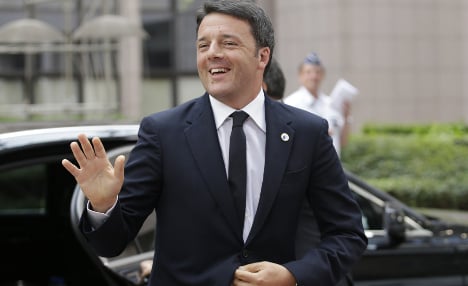“The long history of inconclusive politics is over. Reforms are being carried out, Italy is changing. Onwards!” the prime minister said on Facebook, as senators greenlit the biggest change to the constitution since its inception.
Senators voted 179 in favour and 16 against the reform which will cut their numbers from 315 to 100 and effectively end their ability to bring down governments – a safeguard put in place after World War II to prevent the return of Fascism.
“Thank you to all those who continue to persue the dream of a simpler and stronger Italy,” Renzi said on Twitter.
The youthful Renzi has made streamlining the country's governance by taming parliament's second chamber – which currently has the powers to delay and block legislation –a keystone of his mandate.
The reform still has to go before the lower house and back to the Senate once more before being put to a general referendum expected in mid-2016 – but it is expected to pass all hurdles easily.
“It's a great victory for Matteo Renzi… it will show Italy and Europe that he is able to reform an irreformable country,” Roberto D'Alimonte, political science professor at Rome's Luiss University, told AFP.
“The reform will simplify the formation of governments, the passing of laws, reduce the power of lobbies and make parliament more accountable,” he said, as Italy's newspapers dubbed the day “Super Tuesday”.
Under the current system, the two branches of government have equal weight. Transforming the Senate into a small chamber of regional lawmakers would stop bills getting bogged down in a back-and-forth between the chambers.
It would also bring an end to the political musical chairs that has produced 63 different administrations since 1946.
“It will be a change no government before him has been able to carry out,” said Sergio Fabbrini, director of the Luiss School of Government, noting that the first commission to reform the bicameral system was set up in 1983.
Italy is currently the only European country, apart from Romania, in which the government needs to get votes of confidence in both chambers.
Celebrating
Tuesday's victory is a boost for Renzi, who is keen to refocus attention on Italy's economy following a period of party infighting and a corruption scandal which forced Rome's mayor, a member of his Democratic Party, to resign.
The country, which pulled out of a three-year recession at the start of the year, has been enjoying a balmy period of recovery, with the unemployment rate falling in August to a two-year low of 11.9 percent.
The International Monetary Fund (IMF) last week said Italy was experiencing “stronger than expected growth” and revised up its GDP estimates to a 0.8 percent expansion in 2015 and 1.3 percent in 2016.
The ambitious Renzi, 40, says his reforms are the reason — in particular a package to shake up the labour market that was welcomed by the business world but bitterly denounced by Italy's once-powerful trade unions.
Next on his list is transforming Italy's snail-paced judicial system and schools.
As well as being a feather in his cap, the reforms are key to persuading the European Union to give Renzi the budgetary leeway he wants to be able to boost domestic demand through tax cuts and investment schemes.
Italy's draft 2016 budget will go before the EU on Thursday and this Senate success will doubtless strengthen its case.
Critics largely from the anti-establishment Five Star party and right wing have complained that the Senate reform will give ambitious Renzi authoritarian powers.
Former premier Silvio Berlusconi said this weekend it was a “dangerous system, with only one man in power” – but D'Alimonte dismissed such concerns as “baloney”.
Franco Pavoncello, John Cabot University's political science expert, agrees: “The system had become absolutely unmanageable. This was a reform everyone wanted, but some tried to block simply to create problems for Renzi.”
Parliamentary expert Dino Martirano in the Corriere della Sera daily said: “Renzi will be already be able to celebrate from this evening, because the road… appears to be all downhill from here.”



 Please whitelist us to continue reading.
Please whitelist us to continue reading.
Member comments